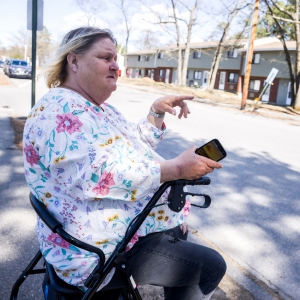Opinion: Downshifting is just another way to say property tax increase
| Published: 05-13-2025 8:00 AM |
Cathy Ann Stacey is the Rockingham County Register of Deeds and president of the New Hampshire Association of Counties. Margaret Byrnes is executive director of the New Hampshire Municipal Association.
In New Hampshire, where fiscal responsibility has long been a point of pride, the New Hampshire House’s proposed budget currently under review by the Senate threatens to undermine the very values that our state is built upon.
By downshifting costs to counties and municipalities, the House proposal risks devastating many services that our communities rely on, while also burdening local governments and taxpayers who can ill-afford any additional financial strain.
For years, New Hampshire has prided itself on its low tax burden. Local and county governments have generally been able to depend on state-level support to assist in funding vital services. However, the House’s budget proposes significant reductions in state aid and revenue sharing, requiring local governments to pick up the tab. The problem is that many of these local entities are already struggling with their own financial constraints, and the new burdens could lead to severe consequences.
If this budget proposal is allowed to stand, local governments will be forced to make tough choices, including raising property taxes, cutting essential services or delaying projects that are critical to the community’s infrastructure. For small towns and rural communities, which already face limited resources and a shrinking tax base, these options are not sustainable.
The most vulnerable will undoubtedly feel the impact the hardest: Seniors, low-income families and children depend on local programs for health care, public assistance and education.
Reducing state funding forces municipalities and counties to raise taxes or cut essential programs. In many cases, these localities simply don’t have the revenue-generating capacity. Below are some specific concerns with the House proposed budget from the New Hampshire Association of Counties and the New Hampshire Municipal Association.
From the perspective of county government, one concern is the county cap. The budget currently increases the amount that counties must reimburse the state for long-term care supports and services by an additional 50% over the biennium, even though the current statute caps the increase. This is a difference of approximately $5.8 million a year for county taxpayers to absorb.
Article continues after...
Yesterday's Most Read Articles
 ‘Deep flavor’ – New restaurant in downtown Concord offers creative spin on comfort food and cocktails
‘Deep flavor’ – New restaurant in downtown Concord offers creative spin on comfort food and cocktails
 ‘Over-regulation is going to create sneakier kids’: Concord High students react to impending bell-to-bell phone ban
‘Over-regulation is going to create sneakier kids’: Concord High students react to impending bell-to-bell phone ban
 Royal Gardens tenants worried about where they will live after building renovations
Royal Gardens tenants worried about where they will live after building renovations
 Reclaiming Healy Park: A symbol of renewal and a reckoning with homelessness in Concord
Reclaiming Healy Park: A symbol of renewal and a reckoning with homelessness in Concord
 Concord receives federal funding to clean old stables, paving way for stagecoach museum
Concord receives federal funding to clean old stables, paving way for stagecoach museum
 Concord-area runners tackle Mt. Washington Road Race
Concord-area runners tackle Mt. Washington Road Race
Reducing the Medicaid rate to all providers by 3%, another concern, will lead to a reduction of approximately $9.1 million for county nursing homes and other county Medicaid funded programs.
While not included in the final proposal from the House, there was also discussion around reviving managed care for long-term care supports and services, such as county nursing homes. If that change were made, counties would stand to lose approximately $60 million in federal funding.
From the perspective of municipal government, the fate of the meals and rooms tax is a significant concern. Replacing the 30% municipal share with a flat $137 million appropriation annually in FYs 26-27 is projected to reduce municipal aid by $11 million compared to the current statutory formula.
Program funding gaps present another concern. The House budget contains no new funding for critical programs like Housing Champions, InvestNH, wastewater projects under State Aid Grants (SAG) or regional planning commissions.
Other items in HB 2 would downshift costs to municipalities and/or lead to increased administrative expenses: Eliminating motor vehicle inspections would reduce municipal revenue by approximately $350,000 per year on a permanent basis. Implementing a statewide ban on DEI initiatives would impose significant time and cost burdens on local governments for contract reviews, cancellations and renegotiations. Changes to CHIP, Medicaid, and Medicaid Advantage programs adding new out-of-pocket costs for participants will impact local welfare budgets.
A shared concern for counties and municipalities is the diversion of $10.7 million per year from the dedicated Opioid Abatement Trust Fund to the Alcohol Abuse Prevention and Training Fund, in conjunction with repealing the traditional funding source for the alcohol abuse fund — 5% of gross annual Liquor Commission revenue.
Setting aside the potential legal questions regarding the transfer, the real-world impact of this change is that the opioid abatement fund will have no money to fund further grants to municipalities, counties and other organizations working to mitigate the opioid crisis — including several new grants just approved by the Executive Council in April. Through the end of FY 2024, municipalities, counties, and other political subdivisions have received nearly $14.5 million in grants through this fund.
We recognize the Senate Finance Committee has a challenging road ahead in fine-tuning the state’s next budget. However, we urge elected officials in Concord to view state budget decisions in the context of local and county impacts: All cuts to state aid to counties and municipalities, and all new obligations passed down, increase local property taxes by increasing local costs.







 Opinion: The art of diplomacy
Opinion: The art of diplomacy Opinion: After Roe: Three years of resistance, care and community
Opinion: After Roe: Three years of resistance, care and community Opinion: Iran and Gaza: A U.S. foreign policy of barbarism
Opinion: Iran and Gaza: A U.S. foreign policy of barbarism Opinion: There’s no place like firearms-free zones
Opinion: There’s no place like firearms-free zones
